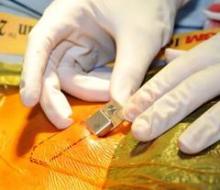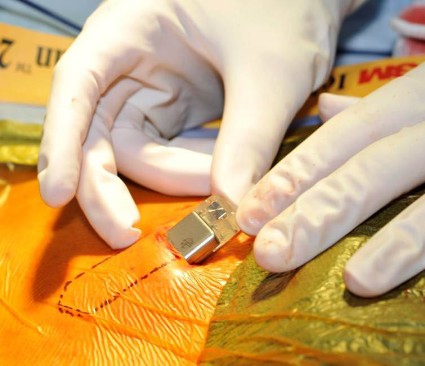User login
SAN DIEGO – Medtronic’s Reveal XT heart monitor implant detected atrial fibrillation missed by older techniques in a randomized trial.
The company’s North American and European CRYSTAL-AF (Cryptogenic Stroke and Underlying Atrial Fibrillation) trial randomized 221 patients to the device after cryptogenic ischemic strokes or, less commonly, transient ischemic attacks, and 220 others to usual monitoring with ECGs or 24-hour Holter monitors. The Reveal XT device, about the size of a computer thumb drive, is slipped under the flesh on the left side of the chest with local anesthesia, and transmits data wirelessly.
After 6 months, the device picked up atrial fibrillation (AF) in 19 patients (8.6%). Standard monitoring detected AF in three patients, or 1.4% (hazard ratio, 6.4; 95% confidence interval, 1.9-21.7; P = .0006).
Fourteen (74%) Reveal XT AF patients were asymptomatic, and 18 (94.7%) were switched from antiplatelet therapy to oral anticoagulants. One control group AF patient was asymptomatic, and two were switched to oral anticoagulants. Every patient in the trial was eligible for anticoagulants because of past embolic events and subsequent CHADS2 scores of 2 or more, but few were on anticoagulants when the trial started.
It’s probably not a surprise that Reveal XT and other modern implantable devices are good at finding AF, but it’s less clear sometimes about how to handle it. The investigators did not report the frequency of AF or the number of strokes, deaths, and anticoagulation complications in the trial.
"If someone had a stroke, and then is found to have AF, it’s hard to ignore that," said presenter and investigator Dr. Rod Passman, a cardiologist and professor of medicine at Northwestern University in Chicago.
There may be less to worry about with younger patients and those with few stroke risks. The mean age in the trial was 62 years, and most of the subjects were men.
However, "we are learning that anticoagulation is effective" in high-risk patients. "The studies were done on patients with a lot of AF, but even small episodes may increase the long-term stroke risk. We are not clear about what the threshold is, but I do think we are honing in [on it]. The question will be if there’s a subgroup at a particularly high risk," he said at the International Stroke Conference, sponsored by the American Heart Association.
After a year, Reveal XT had detected AF in 29 patients (13.1%), most of them asymptomatic. Standard monitoring found AF in four (1.8%), two of whom were asymptomatic (HR, 7.3; 95% CI, 2.6-20.8; P less than .0001). Detecting AF in the four control arm patients took 121 ECGs, 32 Holter monitors, and one event recorder. Almost all of the AF patients in both groups were switched to anticoagulants.
About 27 (93%) of the device AF patients had a maximum 1-day AF duration of more than 6 minutes; about 13 (45%) had episodes of 12-24 hours.
The device continued to outperform older methods at 3 years, the life of its battery (HR, 8.8; 95% CI, 3.5-22.2; P less than .0001).
It was taken out of five patients (2.3%) because of infections or pocket erosions.
Dr. Passman reported payments from Medtronic to work on the trial and significant research grants and speakers’ bureau and consultant fees from the company. The other 11 investigators disclosed personal payments from the company. Three were Medtronic employees. The company funded the trial.
 |
|
Long-term cardiac monitoring is coming into play, and [overtreatment of atrial fibrillation] is a legitimate concern. There’re many questions about where to draw the line between risks and benefits.
But a lot of people in this trial had episodes lasting 12-24 hours, so the probability is high that AF caused their initial stroke. If it turns out that continual monitoring identifies AF cases with the same high stroke risk as the much smaller group we are picking up now, the implications are enormous because we have effective treatments: oral anticoagulants.
Dr. Steven Greenberg is a professor of neurology at Harvard Medical School in Boston. He said he had no relevant financial disclosures.
 |
|
Long-term cardiac monitoring is coming into play, and [overtreatment of atrial fibrillation] is a legitimate concern. There’re many questions about where to draw the line between risks and benefits.
But a lot of people in this trial had episodes lasting 12-24 hours, so the probability is high that AF caused their initial stroke. If it turns out that continual monitoring identifies AF cases with the same high stroke risk as the much smaller group we are picking up now, the implications are enormous because we have effective treatments: oral anticoagulants.
Dr. Steven Greenberg is a professor of neurology at Harvard Medical School in Boston. He said he had no relevant financial disclosures.
 |
|
Long-term cardiac monitoring is coming into play, and [overtreatment of atrial fibrillation] is a legitimate concern. There’re many questions about where to draw the line between risks and benefits.
But a lot of people in this trial had episodes lasting 12-24 hours, so the probability is high that AF caused their initial stroke. If it turns out that continual monitoring identifies AF cases with the same high stroke risk as the much smaller group we are picking up now, the implications are enormous because we have effective treatments: oral anticoagulants.
Dr. Steven Greenberg is a professor of neurology at Harvard Medical School in Boston. He said he had no relevant financial disclosures.
SAN DIEGO – Medtronic’s Reveal XT heart monitor implant detected atrial fibrillation missed by older techniques in a randomized trial.
The company’s North American and European CRYSTAL-AF (Cryptogenic Stroke and Underlying Atrial Fibrillation) trial randomized 221 patients to the device after cryptogenic ischemic strokes or, less commonly, transient ischemic attacks, and 220 others to usual monitoring with ECGs or 24-hour Holter monitors. The Reveal XT device, about the size of a computer thumb drive, is slipped under the flesh on the left side of the chest with local anesthesia, and transmits data wirelessly.
After 6 months, the device picked up atrial fibrillation (AF) in 19 patients (8.6%). Standard monitoring detected AF in three patients, or 1.4% (hazard ratio, 6.4; 95% confidence interval, 1.9-21.7; P = .0006).
Fourteen (74%) Reveal XT AF patients were asymptomatic, and 18 (94.7%) were switched from antiplatelet therapy to oral anticoagulants. One control group AF patient was asymptomatic, and two were switched to oral anticoagulants. Every patient in the trial was eligible for anticoagulants because of past embolic events and subsequent CHADS2 scores of 2 or more, but few were on anticoagulants when the trial started.
It’s probably not a surprise that Reveal XT and other modern implantable devices are good at finding AF, but it’s less clear sometimes about how to handle it. The investigators did not report the frequency of AF or the number of strokes, deaths, and anticoagulation complications in the trial.
"If someone had a stroke, and then is found to have AF, it’s hard to ignore that," said presenter and investigator Dr. Rod Passman, a cardiologist and professor of medicine at Northwestern University in Chicago.
There may be less to worry about with younger patients and those with few stroke risks. The mean age in the trial was 62 years, and most of the subjects were men.
However, "we are learning that anticoagulation is effective" in high-risk patients. "The studies were done on patients with a lot of AF, but even small episodes may increase the long-term stroke risk. We are not clear about what the threshold is, but I do think we are honing in [on it]. The question will be if there’s a subgroup at a particularly high risk," he said at the International Stroke Conference, sponsored by the American Heart Association.
After a year, Reveal XT had detected AF in 29 patients (13.1%), most of them asymptomatic. Standard monitoring found AF in four (1.8%), two of whom were asymptomatic (HR, 7.3; 95% CI, 2.6-20.8; P less than .0001). Detecting AF in the four control arm patients took 121 ECGs, 32 Holter monitors, and one event recorder. Almost all of the AF patients in both groups were switched to anticoagulants.
About 27 (93%) of the device AF patients had a maximum 1-day AF duration of more than 6 minutes; about 13 (45%) had episodes of 12-24 hours.
The device continued to outperform older methods at 3 years, the life of its battery (HR, 8.8; 95% CI, 3.5-22.2; P less than .0001).
It was taken out of five patients (2.3%) because of infections or pocket erosions.
Dr. Passman reported payments from Medtronic to work on the trial and significant research grants and speakers’ bureau and consultant fees from the company. The other 11 investigators disclosed personal payments from the company. Three were Medtronic employees. The company funded the trial.
SAN DIEGO – Medtronic’s Reveal XT heart monitor implant detected atrial fibrillation missed by older techniques in a randomized trial.
The company’s North American and European CRYSTAL-AF (Cryptogenic Stroke and Underlying Atrial Fibrillation) trial randomized 221 patients to the device after cryptogenic ischemic strokes or, less commonly, transient ischemic attacks, and 220 others to usual monitoring with ECGs or 24-hour Holter monitors. The Reveal XT device, about the size of a computer thumb drive, is slipped under the flesh on the left side of the chest with local anesthesia, and transmits data wirelessly.
After 6 months, the device picked up atrial fibrillation (AF) in 19 patients (8.6%). Standard monitoring detected AF in three patients, or 1.4% (hazard ratio, 6.4; 95% confidence interval, 1.9-21.7; P = .0006).
Fourteen (74%) Reveal XT AF patients were asymptomatic, and 18 (94.7%) were switched from antiplatelet therapy to oral anticoagulants. One control group AF patient was asymptomatic, and two were switched to oral anticoagulants. Every patient in the trial was eligible for anticoagulants because of past embolic events and subsequent CHADS2 scores of 2 or more, but few were on anticoagulants when the trial started.
It’s probably not a surprise that Reveal XT and other modern implantable devices are good at finding AF, but it’s less clear sometimes about how to handle it. The investigators did not report the frequency of AF or the number of strokes, deaths, and anticoagulation complications in the trial.
"If someone had a stroke, and then is found to have AF, it’s hard to ignore that," said presenter and investigator Dr. Rod Passman, a cardiologist and professor of medicine at Northwestern University in Chicago.
There may be less to worry about with younger patients and those with few stroke risks. The mean age in the trial was 62 years, and most of the subjects were men.
However, "we are learning that anticoagulation is effective" in high-risk patients. "The studies were done on patients with a lot of AF, but even small episodes may increase the long-term stroke risk. We are not clear about what the threshold is, but I do think we are honing in [on it]. The question will be if there’s a subgroup at a particularly high risk," he said at the International Stroke Conference, sponsored by the American Heart Association.
After a year, Reveal XT had detected AF in 29 patients (13.1%), most of them asymptomatic. Standard monitoring found AF in four (1.8%), two of whom were asymptomatic (HR, 7.3; 95% CI, 2.6-20.8; P less than .0001). Detecting AF in the four control arm patients took 121 ECGs, 32 Holter monitors, and one event recorder. Almost all of the AF patients in both groups were switched to anticoagulants.
About 27 (93%) of the device AF patients had a maximum 1-day AF duration of more than 6 minutes; about 13 (45%) had episodes of 12-24 hours.
The device continued to outperform older methods at 3 years, the life of its battery (HR, 8.8; 95% CI, 3.5-22.2; P less than .0001).
It was taken out of five patients (2.3%) because of infections or pocket erosions.
Dr. Passman reported payments from Medtronic to work on the trial and significant research grants and speakers’ bureau and consultant fees from the company. The other 11 investigators disclosed personal payments from the company. Three were Medtronic employees. The company funded the trial.
AT THE INTERNATIONAL STROKE CONFERENCE
Major finding: After 6 months, Medtronic’s Reveal XT heart monitor implant detected atrial fibrillation in 19 patients (8.6%). Standard monitoring detected AF in three (1.4%).
Data Source: A randomized prospective trial in mostly cryptogenic stroke patients.
Disclosures: The presenter, also an investigator, reported payments from Medtronic to work on the trial, and significant research grants and speakers’ bureau and consultant fees from the company. The other 11 investigators disclosed personal payments from the company. Three of the authors are employed by Medtronic. The company funded the trial.


